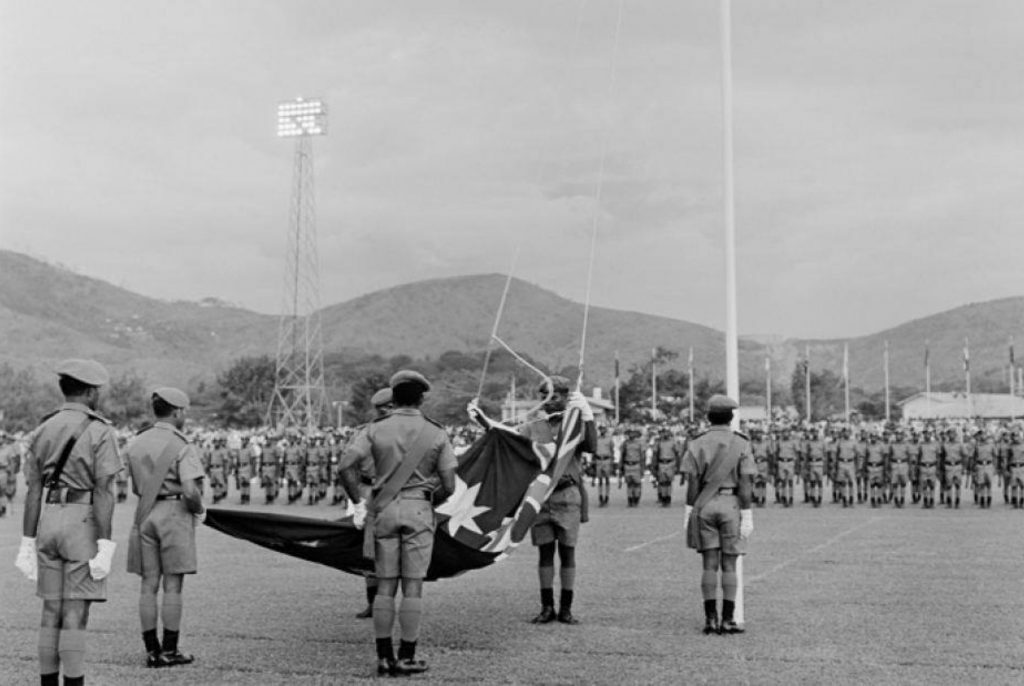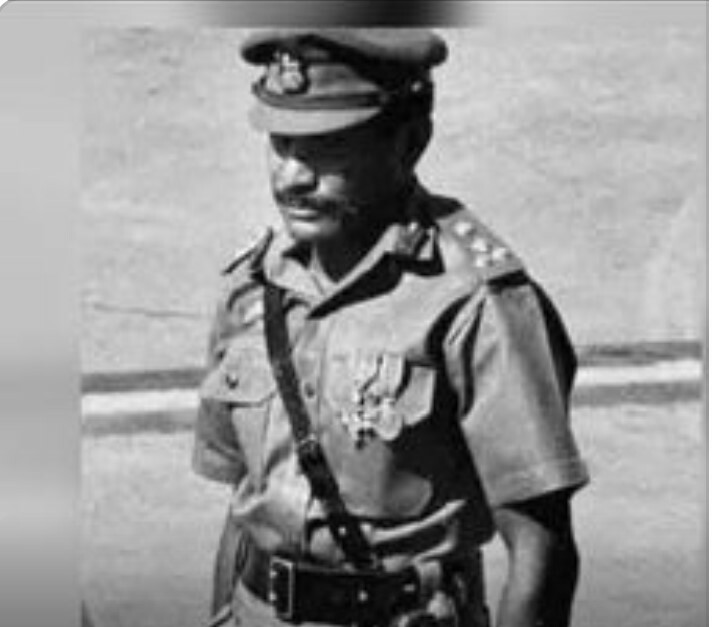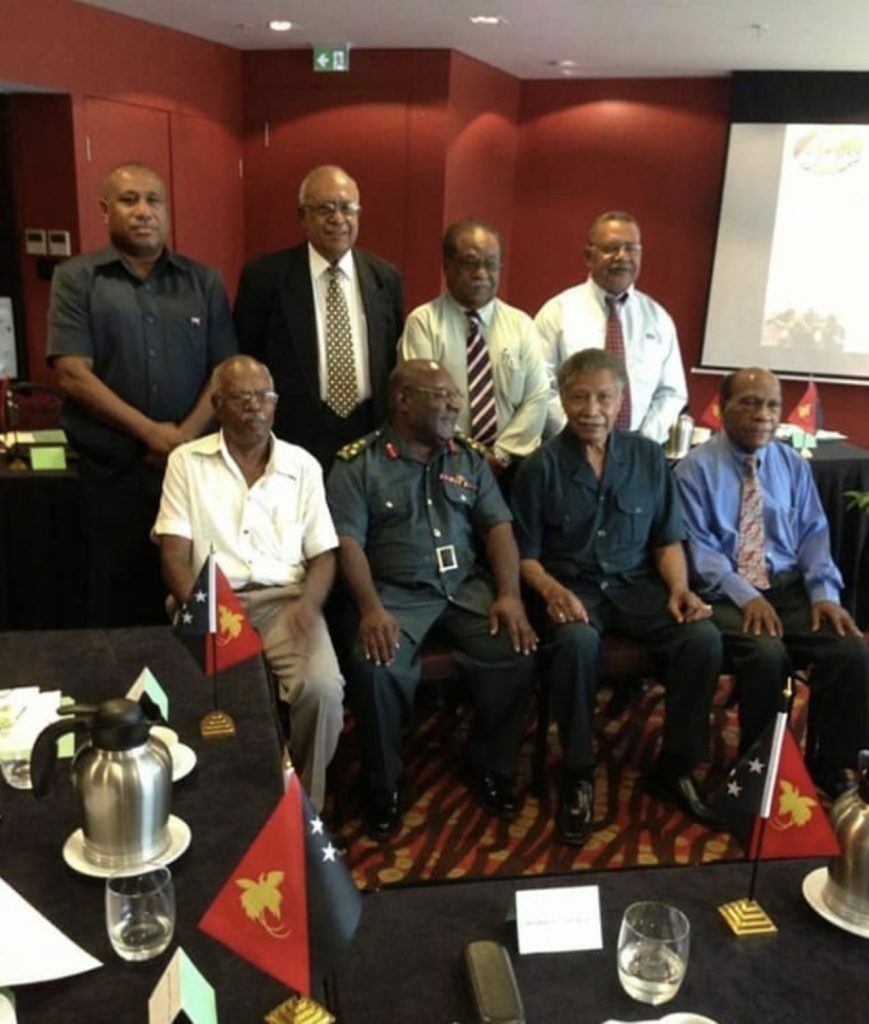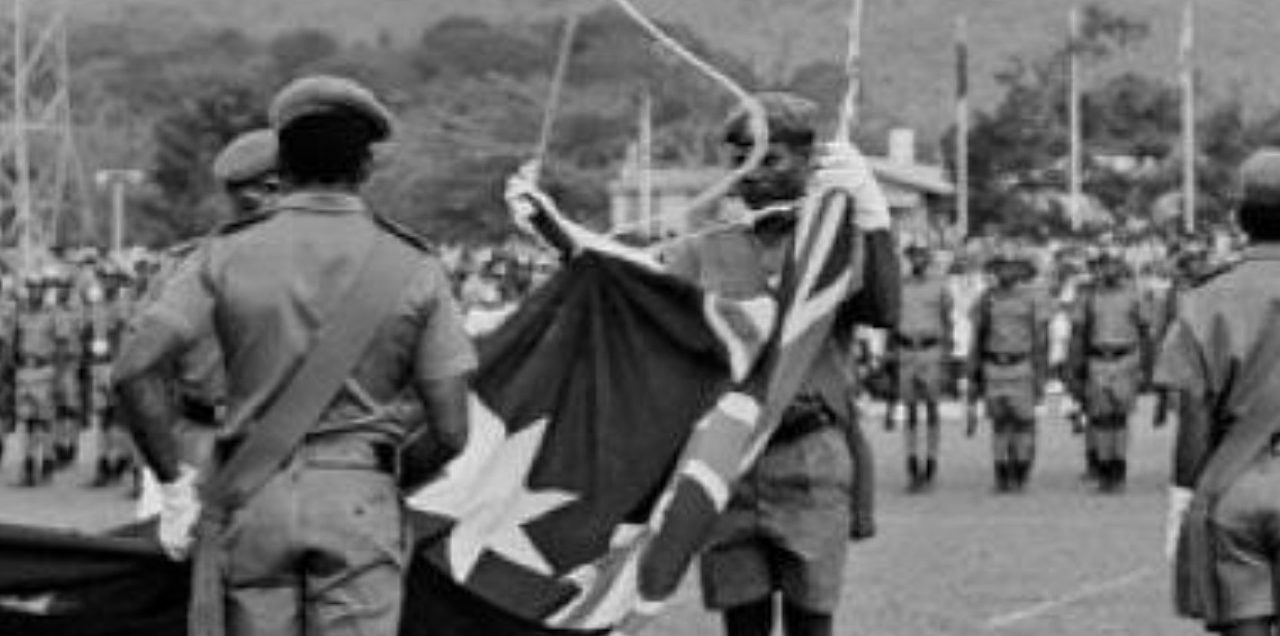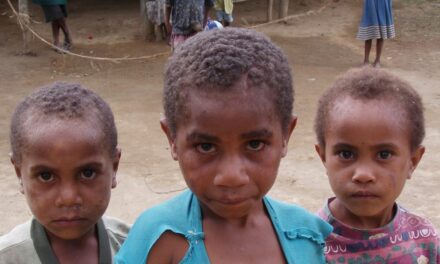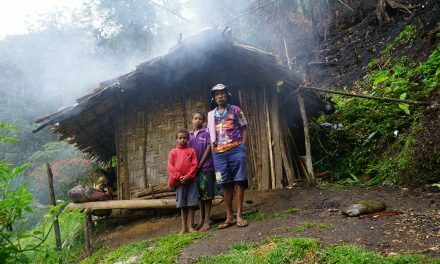PNG is in urgent need of your collective wisdom and your selfless, patriotic leadership.
Members of your league understand that pride and an ethos of service before self are essential qualities of any disciplined force.
A nation’s armed forces are a microcosm of the broader society they represent. If the values of society are compromised due to poor or unstable political leadership, it will obviously have a negative effect on the ethos of the defence personnel who are recruited from it.
The most important elements of pride within the military are based on traditions of service – the most important being battle honours from past campaigns together with awards for bravery and exemplary service as well as traditional services for commemoration.
Many of Australia’s military traditions have originated from our British heritage and have been complemented with our own service in two World Wars and later conflicts. PNG has its genesis in the Pacific War where their ‘nameless warriors’ served with great distinction as ‘green shadows’.
Their pride is evident in old photos of their Anzac Day marches along Ela Beach.
The Australian Returned Services League was our major representative body for ex-servicemen and women – they had a strong branch in Port Moresby which would have included a significant number of officers and NCOs from the Pacific Islands Regiment in the early post-War years but I am not aware of how many non-commissioned Papuan soldiers were represented.
However, I do know that your wartime carriers who were indentured into service and who played a vital role in our war effort were not included and their service and sacrifice has never been formally recognised.
I have tried to play a small part in rectifying this by establishing ‘Network Kokoda’ as a philanthropic body to honour the legacy of your Papuan Infantry Battalion and your wartime carriers. You can check us out at www.networkkokoda.org
Our key objective is to protect our shared wartime heritage along the Kokoda Trail and in other significant places.
We plan to achieve this by conducting fund-raising activities, including grants, donations, and benefactors, in support of our objectives. Our Chairman, Andrew Tracy, is a stockbroker with JBWere in Sydney – they are Australia’s leading private wealth management business and have been generous in supporting our fundraising endeavours by providing us with meeting facilities, access to their networks and sponsorship of boardroom lunches. Several their directors have trekked Kokoda with me and are personally committed to assisting us.
We believe that if we can help develop a successful model of management based on the Kokoda Trail then such a model could be utilised for the development of a wartime tourism industry in PNG with markets from Australia, Japan and the United States. But first we must get the Kokoda model right.
My greatest frustration to date is the fact that I have not yet met anybody within the PNG Government bureaucracy who understands the meaning of ‘Commemoration’ and what a powerful source it can be for national pride.
Those I have met seem to be motivated by their own ideological bias (Australian Government officials) or short-term personal enrichment (PNG bureaucracy). I have a mountain of evidence to support these assertions.
Commemoration
Commemoration is a core feature of national pride – but only if people know the story of the sacrifice their servicemen and women have made in the service of their nation.
This was demonstrated this year when Australians were unable to attend traditional Dawn Services. As an alternative it was suggested that people stand at the end of their driveway’s holding a candle – sound the Last Post on a portable speaker – and observe a minute’s silence for the fallen. The response was overwhelming with families all over Australia participating. I believe it will now become an annual happening.
Commemoration in PNG has not resonated because Anzac Day is an Australian service while Remembrance Day does not symbolize the unique contribution of the Pacific Islands Regiment and the wartime carriers to the allied victory in New Guinea. This can be rectified by working with the RSL to create a joint Anzac Day service through the inclusion of a ‘wartime carriers‘ segment in the service and by proclaiming ‘Kokoda Day’ to tell the PNG story throughout PNG.
For this to happen PNG will have to provide the necessary vision and leadership to honour the legacy of their wartime carriers via the development of an Honour Roll; the striking of a medal; the erection of a cenotaph or ‘Spirit Haus’; and commit to a national day of commemoration.
‘Kokoda Day’ has the potential to be more significant than Anzac Day throughout PNG in due course.
PNG servicemen, women and veterans would be front and centre in all commemoration services related to these proposals.
I have submitted numerous papers re these proposals over the last 15 years but have been unable to enlist any support or commitment from PNG thus far.
Defence White Paper 2013
In your 2013 Defence White Paper the Prime Minister asserted:
‘We live in a relatively benign region among friends with whom we share mutual security interests such that we do not face a distinct conventional external threat. . .’
This is no longer the case. PNG is now central to competing interests between Australia, China, Japan, and the United States. In September 2018, the ABC reported:
‘Australian soldiers could soon begin regular military rotations to Papua New Guinea as anxiety over China’s growing influence in the Pacific region continues to rise. . .
‘A senior Defence department official, speaking on condition of anonymity, said Australia had “taken its eye off” PNG during the long Afghanistan war but was now “refocusing on its close neighbour”. . .
‘The Pacific is a very high-priority area of strategic national security interest for Australia,” Mr Morrison told Channel Seven.
This is indicative of the old saying that nation’s do not have permanent friends – only permanent interests!
Whilst the Australian spotlight has refocused on ‘it’s close neighbour’ it is important that PNG identify what its national defence needs are rather than what Australia thinks they are!
These needs have already been identified by former Prime Minister O’Neill in your 2013 Defence White Paper:
‘As our nation is a ‘land of a thousand tribes’ the PNGDF must be representative of a truly national organisation. Our people want to hold the PNGDF in the highest of esteem. Hence the conduct and appearance of PNGDF personnel as well as the tidiness and cleanliness of Defence instillations will have a profound effect on the morale of the wider public. The PNGDF must always re-establish its basic routine and maintain the highest standards of discipline. The tidiness and cleanliness of all Defence establishments must be a showcase for any publicly owned and maintained infrastructure and facilities.’
‘The service conditions and infrastructure that our service men and women have to bear have deteriorated, resulting in low morale and poor discipline. Hence at the heart of developing our Defence Organisation, there must be a heavy emphasis on improving service conditions, basic equipment and training, health support and a complete revitalisation of service infrastructure in keeping with the high professional standards expected of a modern Defence Force.’
The projected increase in the PNGDF to 5000 personnel supported by a budget increase to 3% of GDP by 2017 did not transpire.
The subsequent lack of attention to ‘service conditions and infrastructure’ would therefore seem to be a contributing factor to the ‘low morale’ and ‘poor discipline’ evident in the recent murder of a Senior Police Commander by drunken soldiers who ignored the State of Emergency in Port Moresby. Of more concern is that a young commissioned officer was involved.
A 2014 overview of civil-military relations in PNG, titled The Military in Papua New Guinea: A ‘Culture of Instability’ But No Coup, by the Institute for Regional Security reported:
‘there have been persistent confrontations between civil and military personnel since the early years of independence, primarily over service conditions, corporate military identity and perceptions of the role of the military (including ‘political interference’ in what the PNGDF saw as military operations in Bougainville), and ‘defence of the constitution’ against corruption or political excess—the classic range of factors underlying military coups the world over’.
Observations
My observations are based on 21 years’ service as a professional army officer followed by 20 years as a Member of Parliament in New South Wales.
Whilst politicians understand the need for a defence force most do not understand the ethos of military service which is based on loyalty, integrity, comradeship, discipline, and pride. To be fair this is difficult for anybody who has not worn the uniform to fully appreciate.
A credible defence force must be non-partisan in a democratic society – it exists to serve the Government of the day without fear or favour. As a result, Defence Force personnel are not permitted to make public comment on defence issues.
In Australia, responsibility for the welfare and conditions of service for serving defence force personnel rests with the Department of Defence while the Department of Veterans Affairs is responsible for Commemoration and the welfare of veterans who have been discharged from the service.
Veterans organizations such as the Returned Services League and Legacy are non-partisan organisations who work with the government of the day regarding Commemoration and veteran’s welfare.
Australia also has a couple of think-tanks that monitor international defence issues and provide informed, non-partisan commentary. These include the Australian Strategic Policy Institute (ASPI); the Institute for Regional Security; and the Royal United Services Institute.
PNG Defence and Veterans Affairs
PNG does not seem to have an independent non-partisan body to lobby the Government on defence issues or to represent the interests its serving and retired personnel.
I would therefore like to offer the following thoughts for your consideration:
1. PNG Flag Officers League (PNGFOL)
Consideration should be given to the formal recognition of the PNG Flag Officers League with appropriate resources to assist in the development of policy for veterans affairs and Commemoration and to engage with think-tanks to develop ideas for defence strategy.
The PNG Flag Officers League would need to be officially recognised as the executive arm of the Papuan Veterans League (see below).
The PNG Flag Officers League should be consulted regarding the appointment of the Secretary to the Office of Veterans Affairs to ensure the integrity of the office and to help avoid partisan ‘political’ appointments.
PNG Office of Veterans Affairs (OVA)
Consideration should be given to the establishment of an Office of Veterans Affairs as a Government funded statutory body within the Office of Prime Minister and Cabinet. It should be responsible for policy development in regard to veterans welfare and Commemoration.
The Australian Department of Veteran Affairs could be invited to provide support for policy development, logistics and administration for both Commemoration and veterans welfare.
The office would provide the missing link between the Department of Defence and retired veterans.
Papuan Veterans League (PVL)
One of the serious omissions of the Australian RSL in the post-war period was their failure to address the representation of Papuan veterans after independence.
Provision should have been made for ongoing membership of the RSL for Papuan servicemen and veterans – or for the establishment of a separate Papuan Veterans League to be affiliated with the RSL.
It might now be worthwhile considering the establishment of such a league with initial Government funding support. The league could seek affiliation with the RSL who could then provide ongoing logistic and financial support.
Conclusion
The economic challenges caused by Covid-19; endemic corruption; and the breakdown of army discipline need to be addressed otherwise the consequences for PNG will be dire.
The key ingredient in addressing these issues is non-partisan, patriotic leadership.
Members of the PNG Flag Officers Association have already devoted most of their lives to the protection of their national sovereignty and understand the concept of service before self.
Recent breakdowns in discipline within the PNGDF are symptoms of a deeper cause relating to poor leadership, service pride and discipline.
The PNGDF is a relatively young defence organization which is yet to develop traditions of service to Commemorate or an ex-services organization to act as a mentor body for younger servicemen and women.
Recommendation
Consideration be given to:
- the formal establishment and resourcing of the PNG Flag Officers Association;
- the establishment of a PNG Office of Veterans Affairs within the office of Prime Minister; and
- the establishment of a PNG Veterans League.
